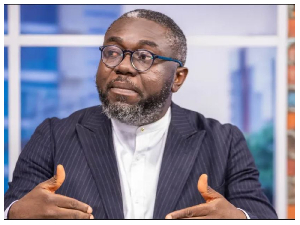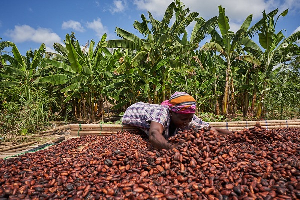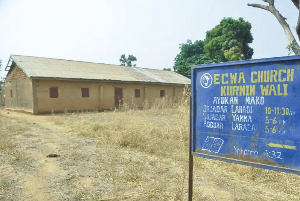The history of policing in Ghana dates back to the days of the Gold Coast Constabulary when military duties and policing were vested in the constabulary under expectedly a colonial officer appointed from the Colonial Office in England.
The old order changed, however, when it was decided by the colonial masters to detach policing from the Gold Coast Constabulary through the promulgation of the Police Ordinance of 1894.
One of the features of the Gold Coast Police was the Marine Police Unit (MPU). For those who do not appreciate the need for this unit, the decision of the colonial authorities even in those days suffices for a response.
Having gone through periods of disbandment and re-establishment, the unit has an interesting history.
After a lengthy hiatus this colonial days’ creation was resurrected, the aftermath of important meetings to respond to emerging developments such as the oil discovery and others.
Commissioner of Police David Asante-Apeatu, the Director General in charge of the MPU, is a fine gentleman who loves his work. Interacting with him recently as the unit informally commemorates its four years of re-introduction, one gets a picture of a man who wants to leave a lasting legacy for generations yet to come in marine policing, a baby he is nurturing.
This feature article is hinged largely on his presentation on the subject and I must say it is a fantastic piece of the history of the Ghana Police Service and by extension of the Gold Coast and Ghana.
As he made available all the necessary pictures and data to help in presenting this feature, he did not show any sign of fatigue or even boredom from my sometimes repetitive questions.
In the beginning it was part of the Police Force of the colonial establishment, having been established on, as COP Asante-Apeatu said, ‘experimental basis’. For unavailable reasons, however, this feature of the Colonial Police was disbanded on 1st April, 1942 and handed over to the Customs Department. The formations of the then Gold Coast Police Force were the General Police, Escort Police, Railway Police, Marine Police Unit and the Criminal Investigations Department (CID). But with the disbandment the number was reduced to four.
Whatever happened to the security roles being undertaken by the MPU following its disbandment is not known and perhaps can be a subject of research by chroniclers of Police history.
In June 1952, however, something prompted the authorities to rescind their decision and reintroduce marine policing as a unit of the Gold Coast Police.
The re-introduction has been informed by a number of factors broadly covering the protection of the environment, natural resources and general security maintenance of the country’s shoreline and some nautical miles into the sea.
Many crimes whose impact on the economy and security are far-reaching continue to be committed by criminals and pirates on the high seas.
The Marine Police personnel, unlike Navy personnel, are versed in prosecution and matters relating to law enforcement as contained in the Police Act. Be it as it may, the work of the MPU is complementary to the Navy’s.
The Navy and the MPU need each other in the rather challenging and perilous mission of policing our part of the Atlantic Ocean.
The International Maritime Authority, according to COP Asante-Apeatu, states that between 80 and 90 percent of maritime crime takes place within the anchorage of coastal states, another factor which makes the role of the MPU sine qua non.
Human trafficking, now a crime in vogue in many parts of the maritime world, has posed a major security threat to many a country. Ghana as a sovereign country is not exempted and so personnel as part of their training are made to appreciate this challenge and how it is their primary responsibility to police.
The get-rich-quick attitude of many persons across the world has made the drug trade very attractive and the most preferred. The oceans have over the years been used by drug pushers around the world.
That is another area where the role of the MPU comes in handy. . Many countries, Ghana not being an exemption, have natural fauna and flora which because of their near extinction and other considerations are protected, protection which cannot be effective if there is no appropriate policing system on the sea—a preferred route to smuggle these out. One of the roles of the MPU is therefore to ensure that such species are not smuggled out to other countries.
Madagascar is said to have some of the rarest species of fauna and so it is common for arrests to be made by smugglers of these species out of the country. It is home to one of the smallest species of frogs in the world among others.
There are portions of the ocean which are natural habitats of some species of marine life and therefore need protection in the form of policing. Only an effective marine policing can ensure that the marine lives here are adequately protected from human predators who need them for various reasons.
The MPU helps the Customs to meet their revenue target by ensuring that smugglers do not use the ocean to evade taxes, another important role which is economic in nature.
In a world where terrorism and insurgency activities are rampant, gunrunning features a great deal. Such activities provide another source of illicit firearms for criminals.
No agency is more primed and mandated to thwart the activities of these hoodlums than a well resourced and trained MPU.
Without adequate policing of our portion of the Atlantic Ocean, bad persons would dump all manner of toxic stuff into the sea and pose a threat to both marine and human lives.
The ocean as a rich source of countless marine life—some yet to be discovered—requires sufficient policing. Therein also lies the importance of an MPU.
The fishing industry contributes immensely to the GDP of the country and as COP Asante-Apeatu pointed out, it provides $1bn—representing 4.5% of the GDP in 2000. A decline of $600,000 by 2008 was attributable to various sources. As an employment means to over two million persons, it is an industry which should be protected by all means.
Without policing some species of fish would soon be depleted. The MPU works hand in hand with the relevant agencies to provide protection for such endangered stocks in specific portions of the sea.
A portion of the sea, although covered by water, is considered part of the land. This portion of the sea therefore, by this description, falls directly under the jurisdiction of the MPU. This is an apt defence for the re-establishment of the MPU.
In their quest for making big catches, smart fishermen have adopted crude and unorthodox means of catching fish. Some of these ways, which include using light to attract fishes and internationally disapproved fishing nets which collect very young fishes, are affecting the variety of fish in our sea. Some of the fingerlings trapped in the disapproved fishing nets are eventually thrown back into the sea.
Chemicals such as DDT are known to be used by unscrupulous fishermen to catch fish. These toxic and lethal chemicals not only kill adult fishes, they destroy young ones and even pose danger to humans who consume the catches.
The discovery of oil and gas in commercial quantities and the need to police the accompanying facilities related to the operations and the industry in general informed the need to put in place the necessary security strategies.
One of these included the re-establishment of an MPU. This was the outcome of the deliberations of a ministerial committee in April 2010.
One of the recommendations which led to the re-establishment of the MPU was the need to increase police presence in areas where exploration of the natural resource is going to be undertaken.
The MPU is charged with, among others, law enforcement activities to protect the facilities from saboteurs, terrorist activities and vandalism.
In April 2011 the MPU was formally re-established, as COP Asante-Apeatu said, “to meet the exigencies of the Service.”
Operations commenced with the provision of six speed boats by government as training for the pioneers of the unit by Leemar Group Limited.
A Marine Police Academy was also established in Aiyanase for the training of personnel, which included physical training, boat and skipper training, and leakage patching among others.
The focus of the MPU, COP Asante-Apeatu said, includes the security patrol of the sea and landing sites and the promotion of compliance and patrol of sea ports.
The MPU would need more facilities to enable it carry out its mandate. It would for instance need more vessels so it can support the Ghana Navy which also undertakes constant patrols of the sea.
We have learnt that the MPU intends setting up stations at Ada, Princess Town, Kpando-Torko and Yeji.
Opinions of Sunday, 17 January 2016
Columnist: Daily Guide














